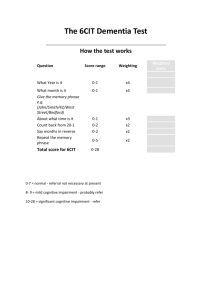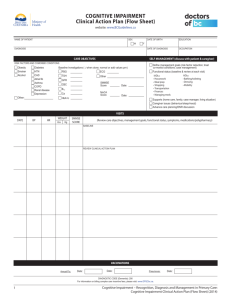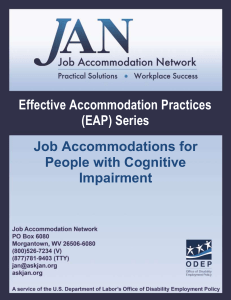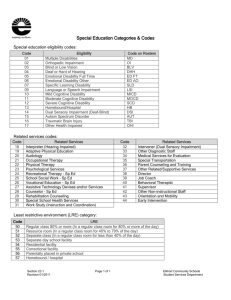presentations/Carter public
advertisement
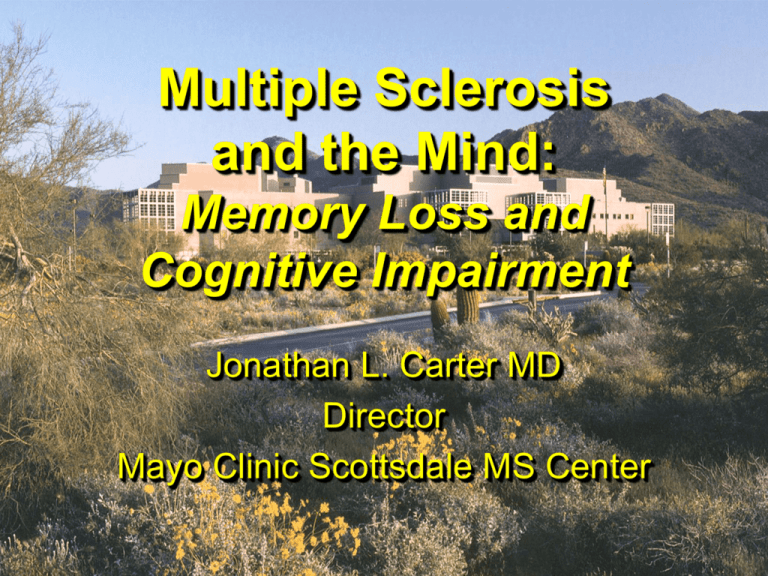
Multiple Sclerosis and the Mind: Memory Loss and Cognitive Impairment Jonathan L. Carter MD Director Mayo Clinic Scottsdale MS Center JLC020303 Outline Frequency of Memory Impairment in MS Patterns of Memory Impairment in MS Correlation with Progression of Physical Disability Correlation with MRI Findings Diagnosis and Treatment of Memory Impairment Memory Impairment and Family/Caregiver JLC020303 MS Cognitive Impairment: Frequency • Community-based studies: Estimated frequency of 43-46% in unselected MS patients • MS specialty clinic or hospitalized patients: estimated frequency of 50-60% • Frequency depends on how cognitive impairment is defined and how carefully it is looked for JLC020303 MS Cognitive Impairment: Frequency Frequency of Impairment in Specific Areas Language 8-9% Visuospatial abilities 12-19% Attention span 7-8% Information processing 22-25% Memory 22-31% Problem solving 13-19% Defined as % of MS patients scoring <5th percentile for normal population JLC020303 Rao et al. Neurology 1991 MS Cognitive Impairment: Patterns • Cognitive areas frequently affected in MS: – Recent memory (short-term memory) – Abstract reasoning – Verbal fluency – Sustained attention (especially with multiple-tasks) – Visuospatial perception JLC020303 MS Cognitive Impairment: Patterns • MS memory impairment: – Unlike Alzheimer’s, MS patients learn when presented with multiple trials of same material – Unlike Alzheimer’s, MS patients perform better on recognition tests than free recall tests; suggesting information is learned and stored but difficult to retrieve without cues JLC020303 MS Cognitive Impairment: Patterns • Cognitive areas not frequently affected in MS: – Language (receptive and expressive) – Attention span (digit span) – Remote memory (long-term memory) JLC020303 MS Cognitive Impairment: Case Study • Cognitive symptoms as early sign of MS: – 54 year old woman was referred to our Clinic for evaluation of memory problems over several months, including disorientation while driving and forgetting appointments – Had to make lists to keep track of daily activities and appointments – Also reported unsteady walking, left hand and foot numbness and urinary incontinence – Score on the Mayo Short Test of Mental Status was 34/38 (normal >29) JLC020303 MS Cognitive Impairment: Case Study • Cognitive testing showed severe problems with short-term memory and new verbal learning and moderate problems with visuospatial perception – All other cognitive areas were normal • Brain MRI showed multiple lesions involving the white matter, and moderate generalized atrophy (shrinkage of the brain) • Cervical spine MRI showed lesions at several levels in the spinal cord • Spinal tap was abnormal, consistent with MS JLC020303 MS Cognitive Impairment: Case Study • Diagnosed with primary progressive MS and has been followed for last 4 years in a clinical trial • Cognitive impairment has slowly progressed during trial – Still functions independently, but husband has looked into hiring a caregiver when he is away during business trips • Brain MRIs have shown progressive atrophy (shrinkage of the brain) during course of the clinical trial JLC020303 JLC020303 JLC020303 JLC020303 MS Cognitive Impairment: Correlation with Disability • Most MS rating scales do not adequately assess cognitive function: – EDSS scale includes cognition as one of 7 subscales; does not require quantitative assessment of cognitive function – EDSS scale is dependent solely on walking ability at range where cognitive impairment often becomes evident (EDSS 4.0 and above) JLC020303 MS Cognitive Impairment: Correlation with Disability – MS Functional Composite (MSFC) includes cognition as one of 3 independent variables: » » » Uses PASAT 3 test which is quantitative Provides better assessment of cognitive function than EDSS scale Increases “weight” of cognitive dysfunction in determining disability – Major drawback is lack of uniform acceptance of MSFC, and greater complexity than single scale JLC020303 MS Cognitive Impairment: Correlation with Disability • Frequency and severity of cognitive dysfunction does increase with increasing physical disability; but correlation is poor: – Patients with progressive MS and predominantly spinal cord disease may have advanced disability but normal cognitive function – Patients with minimal physical disability but extensive white matter lesions on brain MRI may have severe cognitive impairment JLC020303 MS Cognitive Impairment: Correlation with Disability • Presence of CI is single most important determinant of employability in MS patients • Presence of CI correlates with decreased social functioning, greater caregiver stress and “burnout” • Presence of CI may also interfere with health care decisions including poor compliance with treatments, unrealistic expectations of treatments, and excessive reliance on “alternative” or unproven treatments JLC020303 “Red Flags” for Presence of Cognitive Impairment* • Difficulty relaying coherent medical history • Caregiver gives most of medical history • Frequently misses appointments • Appears depressed/withdrawn but fails to respond to antidepressants • Large burden of T2 lesions on MRI • Significant cerebral atrophy on MRI JLC020303 *Adapted from Bourdette; "Cognitive Dysfunction in MS", 2001 MS Cognitive Impairment: MRI Correlation • Cognitive impairment correlates with: – T2 lesion volume (total volume of white matter spots or lesions) – Brain atrophy (shrinkage) measures – T1 “black hole” lesion volume (volume of destructive lesions) – Juxta-cortical lesion volume (lesions near surface of brain) JLC020303 MS Cognitive Impairment: MRI Correlation • Cerebral atrophy and cognitive impairment found in up to 50% of early RRMS patients:* – Rate of development of cerebral atrophy found to be greatest predictor of cognitive decline – Development of cerebral atrophy also correlated with disability progression – Other studies have found rate increase in T2 lesion volume to be strongest predictor JLC020303 *Zivadinov et al; JNNP; 2001 MS Cognitive Impairment: MRI Correlation • Changes in normal-appearing white matter (NAWM) have correlated strongly with CI: – Magnetization transfer (MT) analysis of NAWM shows abnormalities not visible on conventional MRI – One study showed that 68% of total variance in CI was explained by MT abnormalities in NAWM; making this more important than T1 lesion load, T2 lesion load, or brain volume in determining CI – Global and regional cortical metabolism of glucose also correlates with CI and with total lesion area on MRI JLC020303 MS Cognitive Impairment: Diagnosis • Screening Neuropsychological test batteries have been developed for MS • More comprehensive Neuropsychological batteries require 2-4 hours to administer • Screening tests designed for Alzheimer’s such as the Mini-Mental Status Exam are insensitive to MS cognitive impairment JLC020303 MS Cognitive Impairment: Diagnosis • Other factors may need to be investigated: – Many symptomatic MS drugs may have cognitive side effects; including Baclofen, Zanaflex, Tegretol, Neurontin, Clonazepam – Untreated depression may produce cognitive slowing that can mimic cognitive impairment – Cognitive function may worsen during relapse and improve following recovery JLC020303 MS Therapies and Cognitive Impairment • Phase III Avonex (Interferon β1a) study: – Found significant treatment effects on memory and information processing, and trends in visuospatial abilities and executive functions – No significant treatment effects seen in verbal abilities or attention span – % of patients improved, stable, or worse with serial cognitive testing over 2 years favored Avonex group (40% reduction in sustained worsening) JLC020303 MS Therapies and Cognitive Impairment – % of patients who showed sustained changes in cognitive processing speed also favored Avonex group (47% reduction in worsening) – Phase III Avonex study showed reduction in rate of development of cerebral atrophy on MRI during second yr of study in Avonex patients, which correlated with changes in cognitive function – Betaseron and Rebif clinical trials haven’t addressed cognitive dysfunction adequately JLC020303 MS Therapies and Cognitive Impairment • Phase III Copaxone study – Failed to show treatment effect of Copaxone on cognitive tests over 2 years on study – Placebo group showed no decline in cognitive function during study – Therefore opportunity to show treatment effect may have been missed – Effects of Copaxone on MRI measures would suggest positive effect, but not proven JLC020303 Treatment for Cognitive Impairment • 12-week, open label trial of Aricept in MS cognitive impairment: – 17 patients in long-term care facility with moderate to severe impairment (MMSE score <25) – MMSE scores improved at weeks 4 and 12 – Attention, naming, verbal fluency, visual recognition memory, and conceptualization also improved – Major limitations were lack of control group and likelihood of practice effect with frequent testing JLC020303 Treatment of Cognitive Impairment – Other limitations include small sample size, selection of nursing home residents, selection of patients with severe cognitive impairment – Results of preliminary studies have led to a multi-center, double blind, placebo-controlled, randomized clinical trial of Aricept – Mechanism of MS cognitive impairment is different enough from Alzheimer’s that same drugs may not work JLC020303 Treatment of Cognitive Impairment • Other pilot studies have failed to show benefit in treatment of MS CI: – Amantadine (Symmetrel) – Pemoline (Cylert) – 4-Aminopyridine (Fampridine) • These studies based on the idea that “Cognitive fatigue” is important in MS cognitive impairment, which has been suggested by several studies JLC020303 MS Cognitive Impairment and the Family/Caregiver • Cognitive impairment causes increased stress on the family or caregiver • MS patients with CI . . . – Less likely to be employed – Need greater assistance in daily activities and may not be safe to leave alone – More likely to have mood disturbances and depression – More likely to be socially isolated JLC020303 MS Cognitive Impairment and the Family/Caregiver • Family members or caregivers should: – Discuss issues of cognitive impairment with health care professionals at appointments – Accompany patient to appointments to ensure that instructions are understood and carried out – Seek respite care where possible if cognitive impairment is severe – Seek support or counseling if caregiving duties become overwhelming JLC020303 MS Cognitive Impairment: Conclusions • Measurable cognitive impairment may be present from early stages of MS • Cognitive impairment is not usually disabling until later in the course of MS and is highly variable • Cognitive impairment in MS is under-recognized by health care professionals • Early treatment with disease-modifying therapies is best preventative measure at present JLC020303 MS Cognitive Impairment: Conclusions • Further treatment trials for therapies designed for established cognitive impairment are needed • Other confounding factors such as untreated depression and cognitive side-effects of common MS drugs need to be recognized and treated • Family members and caregivers need to be counseled on the impact of cognitive impairment on the MS patient and their family JLC020303
